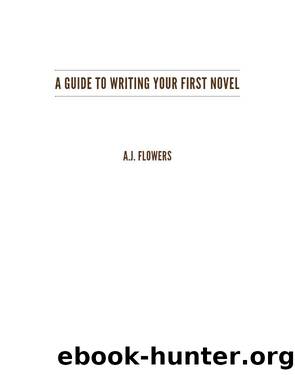How to Write a Book by A.J. Flowers

Author:A.J. Flowers [Flowers, A.J.]
Language: eng
Format: epub
Publisher: FCC Books
A Powerful Theme
Youâve got your first draft! Time to par-tay! And thenâ¦time to edit!
When editing your manuscript (and edit you must), it's easy to get wrapped up in spelling, grammar, dialogue scenes and prose. While those are all vital to a publishable novel, there's a big picture you might be missing. I don't just mean the plot arc and character development, but the full message and theme of your novel.
This was difficult for me to grasp at first. I know it sounds simple: what is your book about? But you can't just say, it's about a father and his struggles. Or, it's about a fire-wielding wizard. You need a powerful message that is going to allow your book to stand off on its own. It'll make blurbs easier to write, and if you plan on publishing your book the traditional route, it'll be vital for pitching your novel to publishers or agents.
Let's look at the first example:
⢠A father and his struggles.
This is too vague. What kind of struggles? What is the novel trying to teach or say? Is it about how fathers are underestimated and undervalued? Or is it about fathers who have lost their way? There needs to be a theme that says what is unique about this novel and is going to make me want to read it. Not only that, but makes me feel like I'm going to be able to learn something important from it. It shouldn't just be a good story, it should be a message that the reader can ultimately appreciate.
Second example:
⢠A fire-wielding wizard.
The fact that the main character can wield fire, and is a wizard, is just a simple vehicle for your message. This actually has nothing to do with your theme. It is simply the packaging you are wrapping around the message. What is the conflict? What are the struggles I can relate to?
If you're like me as I was in the beginning, you write a novel without a theme in mind. The scope is far more narrow. You build up a character from scratch and talk with them every day until they become your best friend. You know them better than you know yourself. You put them in situations that are difficult and challenging, and then, in the end, they (hopefully) get what they were looking for.
But once you reach the end of the novel, take a step back and really try to sum it up for a theme, a message. Maybe you didn't even intend to include one, but you know what? It is an element it needs to have. Especially if you plan on pitching it as a work that an agent or publisher intends to market and sell. A story without a powerful message is going to ultimately be difficult to market.
For example, Twilight. Do you know why it sold so well? Because teenagers around the world could relate to it, however sappy, cliched or drawn out it was. The message is that a young girl
Download
This site does not store any files on its server. We only index and link to content provided by other sites. Please contact the content providers to delete copyright contents if any and email us, we'll remove relevant links or contents immediately.
| Authorship | Bibliographies & Indexes |
| Book Industry |
Asking the Right Questions: A Guide to Critical Thinking by M. Neil Browne & Stuart M. Keeley(5743)
Autoboyography by Christina Lauren(5220)
Eat That Frog! by Brian Tracy(4502)
Dialogue by Robert McKee(4377)
Sticky Fingers by Joe Hagan(4177)
Journeys Out of the Body by Robert Monroe(3605)
Annapurna by Maurice Herzog(3457)
Full Circle by Michael Palin(3434)
Schaum's Quick Guide to Writing Great Short Stories by Margaret Lucke(3366)
Elements of Style 2017 by Richard De A'Morelli(3335)
The Art of Dramatic Writing: Its Basis in the Creative Interpretation of Human Motives by Egri Lajos(3049)
Atlas Obscura by Joshua Foer(2941)
Why I Write by George Orwell(2936)
The Diviners by Libba Bray(2924)
The Fight by Norman Mailer(2918)
In Patagonia by Bruce Chatwin(2909)
The Mental Game of Writing: How to Overcome Obstacles, Stay Creative and Productive, and Free Your Mind for Success by James Scott Bell(2893)
Venice by Jan Morris(2559)
The Elements of Style by William Strunk and E. B. White(2462)
